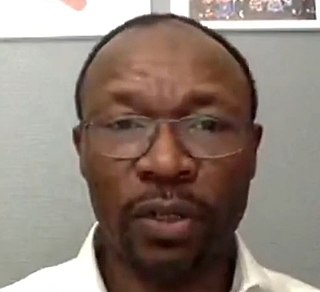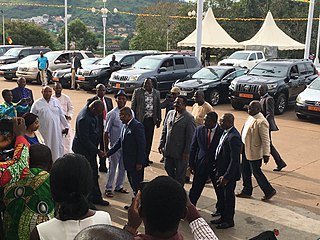Related Research Articles

Ambazonia, alternatively the "Federal Republic of Ambazonia" or "State of Ambazonia", is a political entity proclaimed by Anglophone separatists who are seeking independence from Cameroon. The separatists claim that Ambazonia should consist of the Northwest Region and Southwest Region of Cameroon. Since 2017, Ambazonian rebels are in an armed conflict with the Cameroonian military, in what is known as the Anglophone Crisis, setting up a government-in-exile and capturing some territory. No country has recognized Ambazonia's existence as of 2023.

The Southern Cameroons was the southern part of the British League of Nations mandate territory of the British Cameroons in West Africa. Since 1961, it has been part of the Republic of Cameroon, where it makes up the Northwest Region and Southwest Region. Since 1994, pressure groups in the territory claim there was no legal document in accordance to UNGA RES 1608(XV) paragraph 5, and are seeking to restore statehood and independence from the Republic. They renamed the British Southern Cameroons as Ambazonia.

Ayaba Cho Lucas is an Ambazonian activist. He is the former Secretary General of the Southern Cameroons Youth League (SCYL) and is the current leader of Ambazonia Governing Council, a separatist organization in Southern Cameroons.
Ayaba was expelled from the University of Buea in 1993 because he had led a one-man demonstration against tuition increases; he has been in exile from Cameroon since then. He eventually ended up in Norway, where he studied human rights and development at the Norwegian University of Life Sciences, and from where he has based his activism ever since. In January 2017, Ayaba was allegedly targeted for assassination in Brussels, Belgium.

The Anglophone Crisis, also known as the Ambazonian War or the Cameroonian Civil War, is an ongoing conflict between Ambazonian militant groups and the Cameroonian government in the Northwest and Southwest regions of Cameroon, part of the long-standing Anglophone problem. Following the suppression of 2016–17 protests by Cameroonian authorities, Ambazonian separatists in the Anglophone regions launched a guerrilla campaign against the Cameroon Armed Forces, and later unilaterally proclaimed independence. In November 2017, the government of Cameroon declared war on the separatists and sent its army into the Anglophone regions.
The Ambazonia Defence Forces (ADF) are a military organization that fights for the independence of Ambazonia, a self-declared independent state in the Anglophone regions of the former Southern Cameroons, Cameroon. It was formally established by the Ambazonia Governing Council (AGovC) on 9 September 2017, the same day as the organization declared a war of independence.
Sisiku Julius Ayuk Tabe is an Ambazonian separatist leader from Ewelle village in Manyu division, and is the disputed first president of the unrecognized Federal Republic of Ambazonia. In January 2018 he was extradited from Nigeria to Cameroon, where he has been incarcerated ever since.
This is a timeline of the Anglophone Crisis during 2017.
This is a timeline of the Anglophone Crisis during 2018.
This is a timeline of the Anglophone Crisis during 2019.

From 2018, the Anglophone Crisis drew increasing international attention, and became a challenge to Cameroon's foreign relations. Triggered by a violent crackdown on the 2016–2017 Cameroonian protests, the conflict escalated from a low-scale insurgency to a civil war-like situation. While Cameroon enjoys support from African countries, no country has openly supported the Ambazonian independence movements. However, many countries have put pressure on Cameroon to talk to the separatists. In addition, the separatists enjoy support from officers in the Nigerian Army, who have helped arrange arms deals for them.

The Major National Dialogue is the official name of a dialogue between the Government of Cameroon and various opposition parties, aimed at resolving the Anglophone Crisis. The event took place between September 30 and October 4, 2019.
This is a timeline of the Anglophone Crisis during 2020.

The Ngarbuh massacre took place in northwestern Cameroon on 14 February 2020 during the Anglophone Crisis, and resulted in the murder of 21 civilians, including 13 children, by Cameroonian soldiers and armed Fulani militia.

Operation Free Bafut was a week-long Cameroonian military operation against the Seven Karta militia in and around Bafut that resulted in the deaths of two separatist generals.

Operation Bamenda Clean is an ongoing Cameroonian special counter-insurgency operation in Bamenda, Northwest Region, aimed at preventing armed Ambazonian separatists from operating in the city. By January 2021, Cameroon was gradually achieving what a security analyst at the University of Yaoundé called "relative peace" in Bamenda, and the mayor of the city stated that the operation was succeeding. However, as of March 2021, separatist-imposed ghost towns remained widely respected by the local population, and separatists controlled most roads leading in and out of Bamenda.
This is a timeline of the Anglophone Crisis during 2021.
Clement Mbashie, better known by his nom de guerre "General No Pity", is an Ambazonian separatist who commands several militant groups, most importantly the Bambalang Marine Forces and Bui Unity Warriors, in the Anglophone Crisis.
Widikum is a town and capital of the Widikum-Boffe district in Cameroon. It also serves as the Ambazonian capital of Midland State. Home to the Widikum Tribe, it is located in Momo County in northwestern Cameroon. Within the district, the town has a population of 28 152 (2005). The town is located at the meeting point of the Momo and Man River.
The Anglophone Crisis, an ongoing civil war between the Cameroonian state and Anglophone separatists who are trying to establish a new state called "Ambazonia", broke out due to grievances which built up within Cameroon at large and its English-speaking parts specifically over several decades.
References
- ↑ "Fon Gorji Dinka". mukanda.univ-lorraine.fr. Retrieved January 9, 2020.[ permanent dead link ]
- ↑ "All you need to know about the origin of the name 'Ambazonia'". Mimi Mefo Info. October 2, 2019. Archived from the original on November 27, 2020. Retrieved January 9, 2020.
- ↑ "Republic of Ambazonia". ambazonia.org. Retrieved January 9, 2020.
- 1 2 "Cameroon's Anglophone crisis: The imminent brink of war". Africanews. APO Group. February 11, 2019. Archived from the original on February 25, 2019. Retrieved January 9, 2020.
- ↑ Fatunde, Tunde (October 10, 2017). "President cracks down on, shuts Anglophone universities". University World News. Cameroon. Archived from the original on August 30, 2020. Retrieved January 9, 2020.
- ↑ Foretia, Denis. "Cameroon continues its oppression of English speakers". Washington Post. Archived from the original on May 24, 2020. Retrieved January 9, 2020.
- ↑ Gorji-Dinka v. Cameroon, Comm. 1134/2002, U.N. Doc. A/60/40, Vol. II, at 194 (HRC 2005) ( Human Rights Committee March 17, 2005).
- ↑ "Cameroon's Anglophone War – Analysis". Eurasia Review. IRIN. August 9, 2018. Archived from the original on March 1, 2021. Retrieved January 9, 2020.
- ↑ "Gorji Dinka Releases Ambazonia Message". CameroonPostline. Archived from the original on May 21, 2020. Retrieved January 8, 2020.
- ↑ Nkwi, Paul Nchoji, ed. (February 3, 2015). The Anthropology of Africa: Challenges for the 21st Century. Langaa RPCIG. p. 478. ISBN 978-9956-792-79-5. Archived from the original on April 28, 2022. Retrieved January 18, 2020.
- ↑ "President cracks down on, shuts Anglophone universities". University World News. Archived from the original on August 30, 2020. Retrieved January 18, 2020.
- ↑ Dinka, Gorji. "Appel Aux Forces Armees Camerounaises". Peuples Noirs Peuples Africains (in French). Archived from the original on December 21, 2019. Retrieved January 8, 2020.
- ↑ "History". www.ambazonia.org. Archived from the original on April 14, 2020. Retrieved January 8, 2020.
- ↑ "Cameroon's Anglophone War – Analysis". Eurasia Review. Integrated Regional Information Networks. August 9, 2018. Archived from the original on March 1, 2021. Retrieved January 10, 2020.
- ↑ "Gorji-Dinka v. Cameroon, Comm. 1134/2002, U.N. Doc. A/60/40, Vol. II, at 194 (HRC 2005)". www.worldcourts.com. Archived from the original on May 18, 2021. Retrieved January 9, 2020.